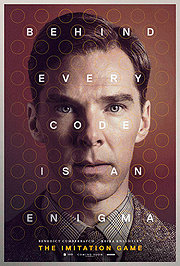“The Imitation Game” Is Anything But An Imitation
“The Imitation Game,” a British thriller directed by Morten Tyldum, stunned viewers after its release.

Photo Courtesy of The Weinstein Company
“The Imitation Game,” focusing on the story of Alan Turing, was entertaining and a fresh outlook on gay rights.
February 1, 2015
On Sunday, Jan. 25, I went to see the British thriller “The Imitation Game,” though many of you may know it as “that one movie starring Benedict Cumberbatch.” The movie details the true story of mathematical prodigy Alan Turing (Bric-a-brac Crampystack) in cracking the Germans’ supposedly unbreakable cipher during World War II.
The cipher, dramatically titled Enigma, was applied to every radio transmission the Germans made, from attack plans to weather reports to U-boat and convoy locations – the information was open, floating in the air, but nobody could understand it due to the fact that the code changed daily. Only Turing had an idea – he theorized a machine that was programmable to decipher the Germans’ code for the day but could be reprogrammed to figure out whatever the next one would be as well. Today we call them computers.
This movie was exceptional in several ways – first and foremost, for its surprising stance on gay rights, which you might not expect to see in a movie like this. You see, Turing was a closeted homosexual. After the end of the war, he was charged by the British Empire with indecency. He was given a choice – prison or “hormonal therapy” to cure his “homosexual predilections.” Turing, who by this point was obsessed with his machine, which he christened Christopher (after his first love), chose the hormonal therapy, saying, “I can’t work from prison.” The treatment ruined him – fogged his mind, made him more emotional and prone to panic attacks, and didn’t even cure his homosexuality (maybe because it isn’t a disease and doesn’t need to be cured).
The movie, in showing the effects of the hormonal treatment on Turing’s body, shows a decidedly pro-gay attitude. I’m a strong supporter of gay rights, and seeing a movie which brought that message to so many people is really amazing. This, combined with a fantastic screenplay and vigorous editing, served to make “The Imitation Game” a must-see, but not quite for everyone.








